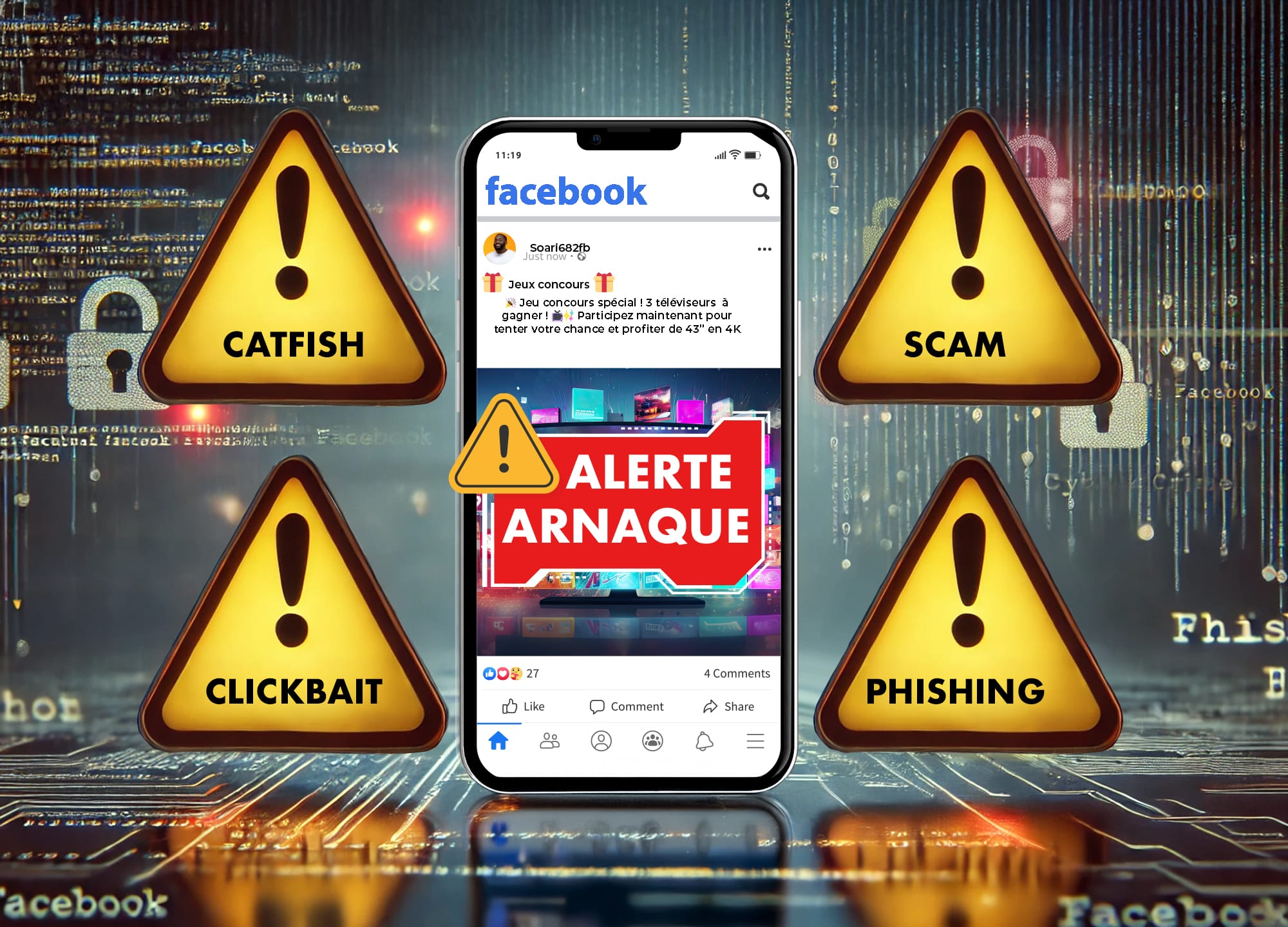If today scams on social networks exist on all platforms, those of the Meta group are the most concerned. Focus on Facebook, Eldorado of the crooks.
In April 2024, a F-Secure study detects a large increase in scams on Facebook. According to her, 62 % of its users are confronted there every week. This makes it the network most at risk for people who are not aware or lacking in vigilance, particularly in Africa, where individuals often have vulnerabilities on the subject. Within the continent, Facebook is used for personal social purposes, but also professional and economic.
According to scams, the price to pay for victims can thus be a substantial financial loss or a data theft that can lead to identity theft, often coupled with a waste of time. According to a study carried out by Interpol in 2020, Online scams have led to global losses of more than a billion dollars. The psychological impact on the victims is also to be taken into account. These can suffer from emotional disorders Intense and show symptoms of depression, anxiety or even post-traumatic stress after being extorted. Scam, Catfish, clickbait, phising… Many scams coexist on Facebook. To strengthen the digital security of the population in 2024, it is crucial to train in identifying and detecting them.
Far from being new, the phenomenon appeared in the 2000s. Who are these scammers? Commonly called "grazers", in reference to the sheep which feed effortlessly, they would be mainly present in Côte d'Ivoire as well as in Cameroon, Benin, Nigeria and Ghana.
Different types of scams on Facebook
From the most frequent, what are the most widespread scams? How to recognize them?
The game Fraudulent Competition or "Win has taken/free gift"
These competitions are promoted by false accounts, often with the image of known personalities or brands, to put the victim with confidence and better extract his information. Other characteristic signs exist to recognize them: spelling mistakes, inconsistencies in messages, a blurred or modified logo, doubtful and unofficial URLs. The request of sensitive data in itself must put the chip in the ear. The interlocutor will tend to use an urgent language, limiting for example the offer over time, to prevent the victim from thinking too much. Any account asking you to pay fees to claim a price is also to be qualified as an office scam.
Each year, the South African supermarket channel Pick n Pay alert on false competitions traveling on Facebook, promising gift cards to participants. In 2022, one of these competitions targeted thousands of victims. Some would have lost considerable sums after transmitting their bank details.
False advertising on Facebook Marketplace or "Shopping Scam"
So beware of "too good to be true" on generally expensive products. The payments requested by the use of non-traçable methods, such as Moneygram. It is therefore a question of favoring secure payment platforms allowing to recover your funds in the event of a dispute, such as Paypal.
Particular attention must be paid to the seller's profile itself, fraudsters often using recent accounts, anonymous or containing little personal information. It is important to check whether the products offered are consistent with the seller's profile. Any user requesting payment outside the platform is also to be suspected.
In 2021, a Nigerian user was the victim of a scam on Facebook Marketplace, by paying a phone that she will never receive. From 2022, complaints related to online fraud increased 32 % in Nigeria.
The sentimental scam or "romance scam"
Targets are often identified as "vulnerable people", like socially isolated people, or individuals in times of mourning. There are some keys to recognize these profiles. The scammers create profiles often too perfect, or idealized. So beware of perfect photos and fascinating careers. The interlocutor will quickly pretend a certain attachment, even strong feelings, thus beginning the attempt to manipulate. A constant refusal of physical meeting or an absence from the appointments given is also a strong sign. As well as for requests for financial transactions abroad, in particular via non-traçable methods such as Western Union. One last attention is to be paid to the language used. For example, messages that may have been automatically or awkwardly translated, with recurrent spelling and grammar errors are announcing.
In 2021 in South Africa, these scams received more than 2,000 people, with losses reaching 43 million euros, according to a study by the South African Banking Risk Information Center (Sabric).
The scaled account scam
This is unwinding in particular by sudden changes in communication in communication, unusual coming from the person whose account was hacked. Scammers taking control of a hacked account often use an emergency tactic: pressing and insistent messages are a sign to monitor. They can play on emotions, pretending to be a situation of distress and push the contacts to react without thinking. Suspicious links and files can also be sent, of the type "Watch this video of you", intended to infect other accounts, or even third -party user devices. Another visible sign, the activity of the account may indicate a hacking, so particularly abnormal. It is then imperative to prevent the person concerned through another platform. She can then reset her passwords and contact Facebook support to report fraud.
In 2023, in Kenya, users were the targets of hackers targets, having control of their accounts to beg for money to their listed friends. The same year, reports of these hacks increased by 25 %, according to Kenya Cyber Security Annual Report.
How to react to a scam on Facebook
Accessible to any user, Facebook sets up reporting pages, in order to delete publications, profiles, or even block the malicious user.
To report a false Facebook account, the journey is as follows:
👤 Go to the profile in question → Click on the three points → report → scam or false identity.
As part of a scam on Facebook Marketplace, the journey is as follows:
💻 On the suspect ad → Click on the three points next to the title of the ad → report → counterfeit or fraud product.
💳 On the seller's profile → report → fraudulent sale.
Facebook also gives keys to protect your account .
Approach to follow for the victims
🔒 If the scam concerns personal data
after reporting fraudulent behavior to the platform, it is important to change your own passwords, on Facebook as elsewhere if passwords are identical. It is relevant to update and manage the confidentiality of the platform for your information. It is essential to monitor any attempt to use identity, in particular by a request to local authorities to prevent the malicious use of your information.
📞Is the scam concerns financial flows
any user victim of online extortion must quickly contact their bank to warn on the incident and get locking their bank cards if necessary. It is also necessary to monitor its account statements in order to detect any abnormal activity.
How to be reimbursed? Contacting your banking advisor also allows you to know the refund policies in the event of fraud. On the other hand, the success of the reimbursement depends on the speed of the report as well as the circumstances of the fraud. A formal complaint to the local cybercrime authorities is often necessary to obtain an in -depth investigation by the bank.
Tools to protect yourself from scams on Facebook
Today, most of the online scam reports do not lead in view of the complexity of such a phenomenon. Fortunately, tools exist to protect the population. Proposed by the platform, two -factors authentication (2FA), will secure your account more, by adding an additional password layer. The use of a password manager allows you to automate strong passwords, preventing scammers from accessing several of your accounts both in the event of a flaw. Navigator extension, the anti-phising filter directly blocks the malicious sites, before you can access it. Finally, most networks of which Facebook offer notifications alerting unrecognized connection attempts, instantly warning the user.
Unfortunately, no tools exist to date to fight against scams manipulating individuals, as is the case for Romance Scam. Only education and awareness of cybersecurity allow people to recognize the signs of a scam.
Facebook scams: in conclusion
The soaking these scams on the continent underlines the urgency of increased awareness of cybersecurity. Regarding the entire connected world, the pecuniary, psychological and social impact of these scams is increasingly worrying. Today, the tools proposed by Meta are not enough to counter these threats. Each individual must go by himself to be to protect himself.
If Facebook is the platform that exposes the most users to these scams, WhatsApp is the one on which the scams work best. The private dimension of the network, such as the lack of supervision of this desired private messaging, allocate great freedom to scammers. This freedom of maneuver is actually a fertile terrain for scams of all kinds, far from the control of public platforms and their tracking algorithms. The victims then find themselves isolated against cybercriminals.









